IOS two-day Online National Conference on “Maulana Abul Kalam Azad: Personality, Contribution and Relevance”
IOS two-day Online National Conference on “Maulana Abul Kalam Azad: Personality, Contribution and Relevance”
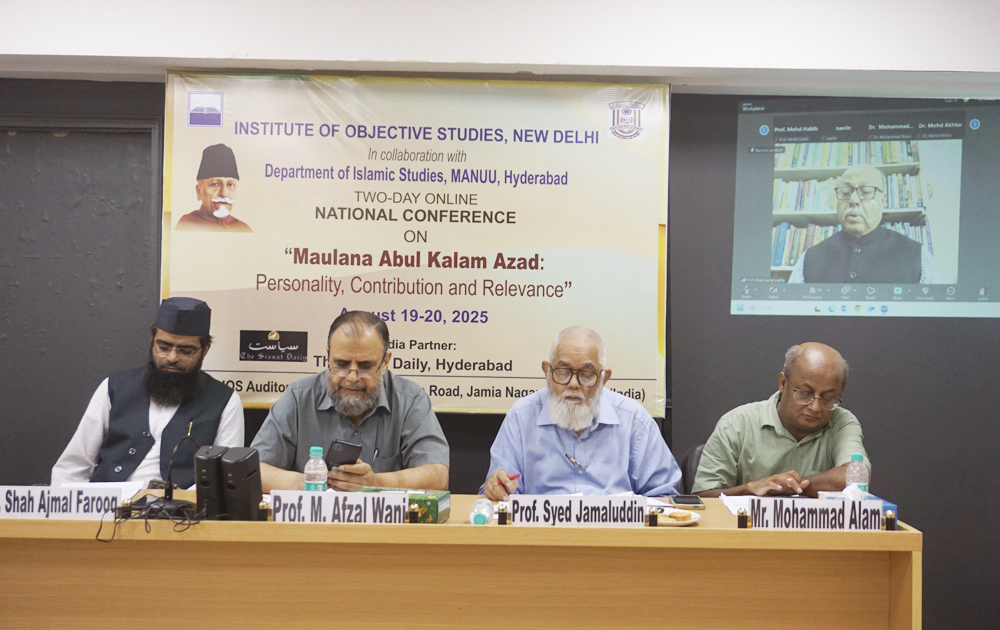
New Delhi: A two-day online national conference on “Maulana Abul Kalam Azad: Personality, Contribution and Relevance (Imam-al-Hind Maulana Abul Kalam Azad: Sakhsi Azmat aur Asri Ma’anwiyat)” was organised by the Institute of Objective Studies, New Delhi in collaboration with the Department of Islamic Studies, Maulana Azad National Urdu University (MANUU), Hyderabad on August 19 and 20, 2025 via ZOOM.
Inaugural Session
Conducted by Maulana Shah Ajmal Farooq Nadwi, incharge, Urdu section, IOS, the inaugural session began with the recitation of a Qur’anic verse by Hafiz Adnan Ahmad Nadwi of the Institute.
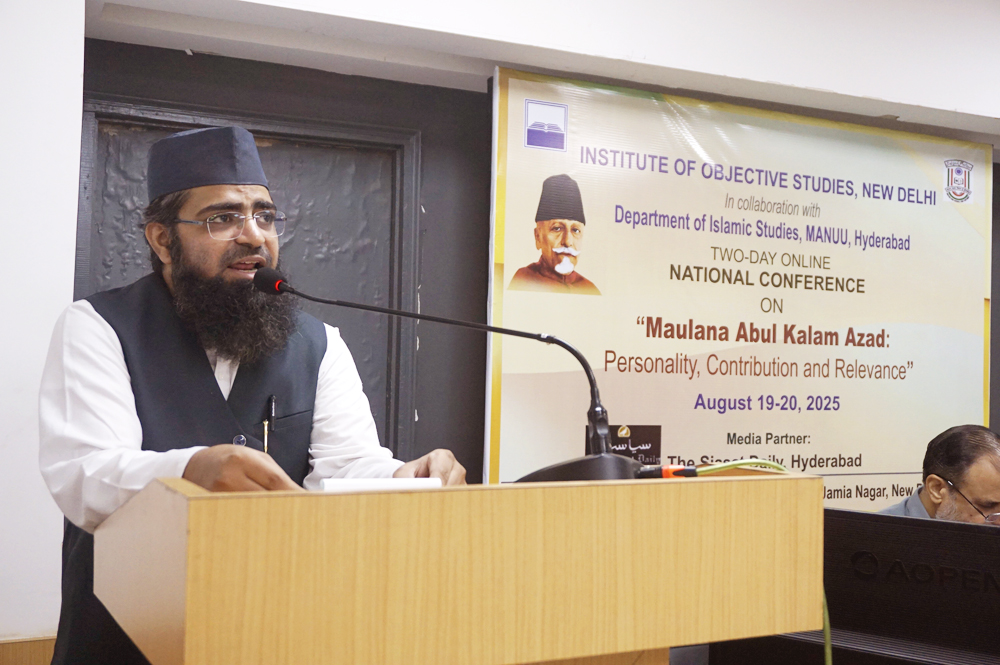
In his introductory remarks, Shah Ajmal Farooq Nadwi said that the Institute had been organising national and international conferences every year on notable personalities since the last 10 years. A number of books, focusing on the personality of Maulana Azad and his contribution as a writer and educationist, had been written. Keeping his invaluable endeavours to put India on the map of higher education and research, the IOS deemed it fit to remember his service to the nation in the field of science, technology and culture, he observed.
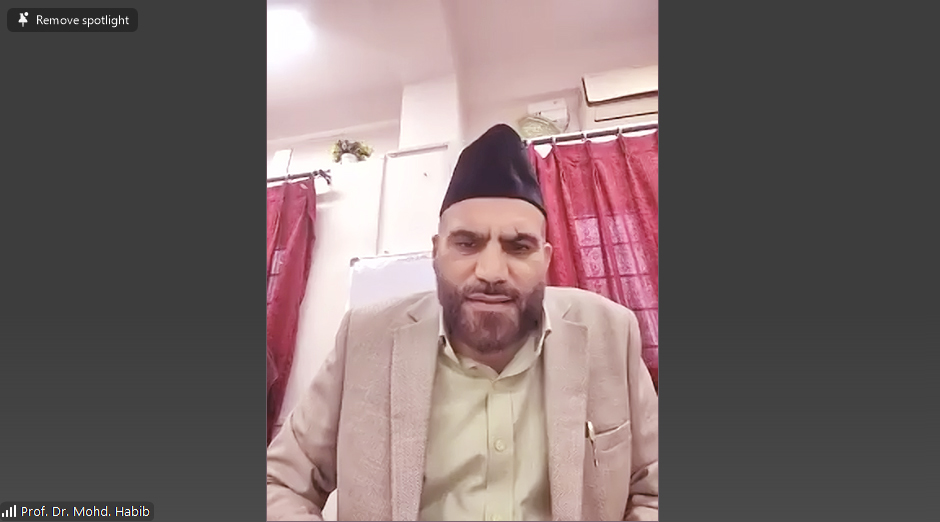
In his welcome speech, Head of the Department of Islamic Studies, MANUU, Prof. Mohammad Habib, made the mention of IOS as a co-organiser of the conference. He said that the Institute had carved out a name for itself as an institution engaged in research on socio-economic issues of the country for the last 40 years. The Institute has published more than 400 titles on history, politics, economy, etc. The second organiser was the Department of Islamic Studies of the Maulana Azad National Urdu University (MANUU), Hyderabad, which was not only a department engaged in the teaching of the Qur’an, Hadith and Sufism, but it also promoted research in these fields and kept the younger generation abreast of them. Referring to Maulana Azad, he held that the Maulana’s personality was multi-dimensional. He was an interpreter of the Qur’an and a great Islamic scholar. He played a leading role in the freedom movement. Besides, he considered Hindu-Muslim unity not only as a moral responsibility, but also as a religious duty. His message was more relevant today. He was of the opinion that success of a nation lay in knowledge and tolerance. He introduced the main speakers of the conference.
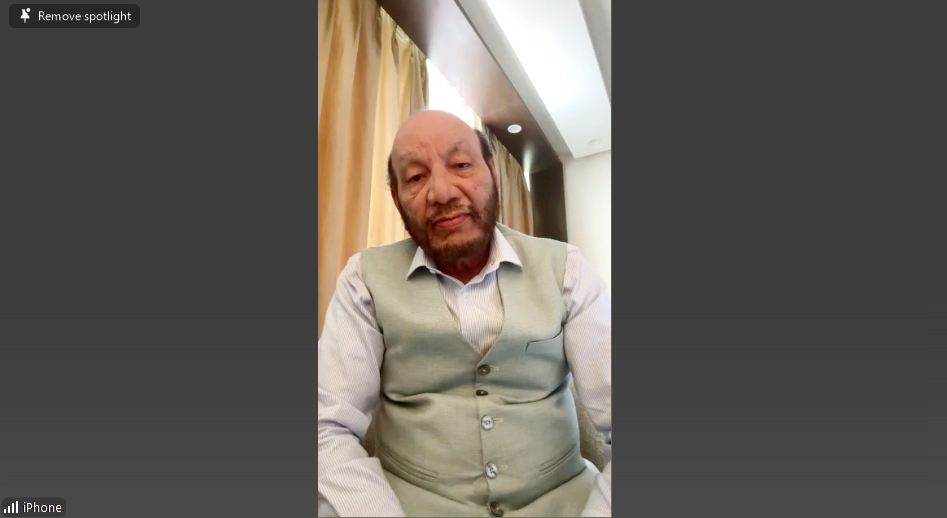
In his inaugural speech, the Vice-Chancellor of MANUU, Prof. Syed Ainul Hasan, observed that about 40 programmes were organised on Maulana Azad in the last 4 years. He said that he wrote on the Maulana in Persian. Some fifteen years ago, he organised an international conference on him, the proceedings of which were published later. He was desirous of knowing more about him. Despite knowing enough about the Maulana, a lot still remained to be known about him. At a time when Mohammad Husain Azad, Sir Syed Ahmad Khan, Altaf Hussian Hali, etc., were at their peak, the Maulana as a young man carved a niche for himself. His Al-Hilal was a testimony to this. He met Gandhiji in 1920 and Jallianwala Bagh massacre united the people against Britishers. Ulema came out in big numbers along with Maulana Azad. In 1923 he was made the president of the Indian National Congress. It was a rare feat which he achieved at the young age. He held that a person could be specialised in one field, but the Maulana was in different roles at the same time. He remarked that he worked on his poetry too. He penned many Ghazals. Khutabat-e-Azad, Nigarshat-e-Azad, Azad and Malfuzat-e-Azad (Memoirs) were the best examples of his works. He maintained that the Maulana was endowed with unparalleled qualities. The Maulana made sacrifices for a cause. He was the votary of ‘unity in diversity’, Prof. Hasan added.
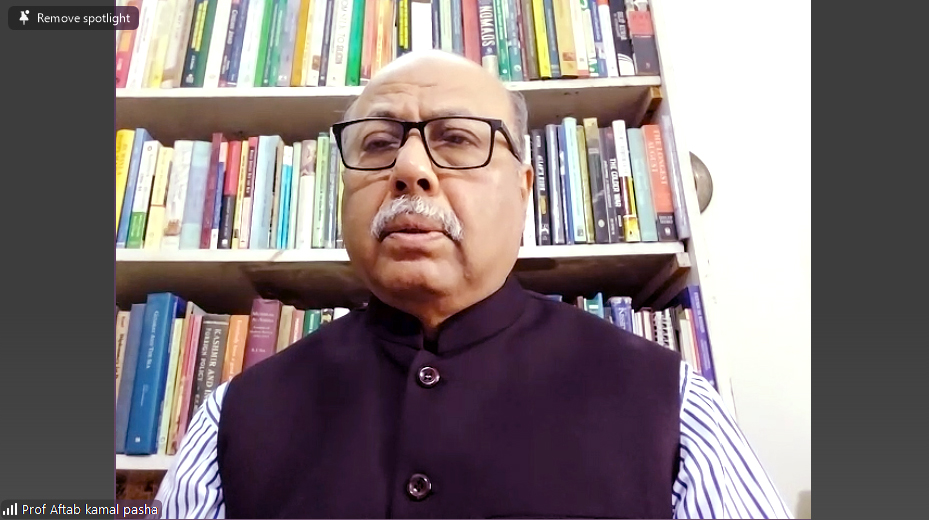
In his key-note address, former director, Gulf Studies Programme, Jawaharlal Nehru University, Prof Aftab Kamal Pasha, said that Maulana Azad was a multi-dimensional personality, author, writer, educationist, political leader, scholar, etc. He was known as a freedom fighter. He was also remembered for Hindu-Muslim unity. He was a great philosopher and an outstanding scholar of Islam. He noted that Maulana Azad was a man of mission. For him, partition was a tragedy for India. He played a vital role in Khilafat movement. As education minister in Independent India, he founded Indian Institute of Technology, Indian Institute of Science, University Grants Commission and many other institutions. He was a successful journalist and a brilliant debater. In 1924 and 1940, he became the president of the Indian National Congress. He was the first education minister after Independence who contributed to primary education and women’s education. He established several universities in India.
Prof. Pasha held that a good school was a gracious asset for any country. Gandhiji used to consider Maulana Azad as an emperor of understanding and learning. He was also one of the founding members of Jamia Millia Islamia. Just after Independence in 1947, he worked hard for the rehabilitation of the homeless people. He tirelessly worked for the security and protection of Muslims. He was elected to the Lok Sabha in 1952. His speeches in the House reflected his vision for building India a strong nation. He was elected president of the UNESCO. His contribution to adult education was much acclaimed. For the exceptional services rendered by him to the nation, he was given the country’s highest civilian Award, the Bharat Ratna. He said, “I am a Muslim, but proud of the heritage of my country.” He was the champion of Hindu-Muslim unity. The leading newspaper of Egypt, Al-Ahram published several articles on the Maulana covering his notable achievements related to Islam and the country. Prof. Pasha dwelt on the long struggle of Maulana Azad during the freedom movement and also in the post-Independence era.
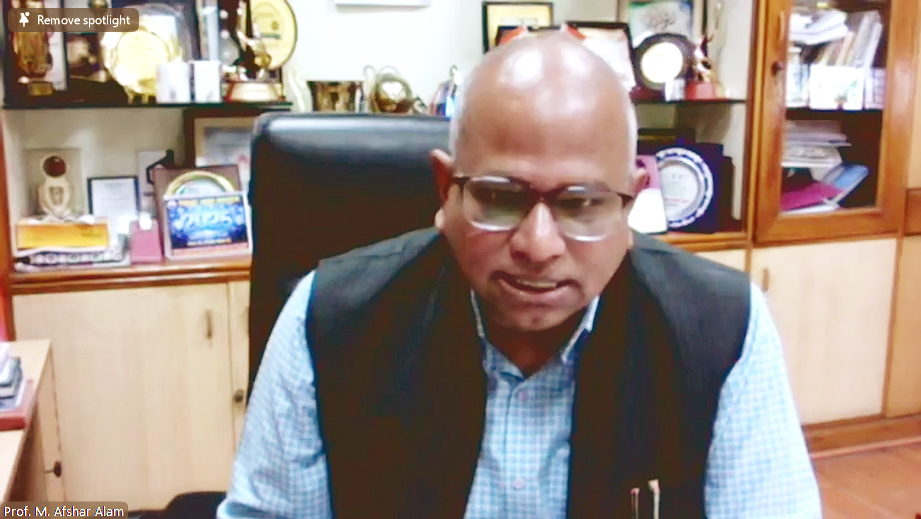
As a guest of honour, the Vice-Chancellor of Jamia Hamdard, New Delhi, Prof. Dr. Mohammad Afshar Alam, described Maulana as a scholar par excellence. He was well-versed in Urdu, Arabic and English languages. He had an independent mind and committed himself to communal harmony. He was the youngest among the other leaders of freedom struggle. He established IIT, IISc., Akademis and championed the cause of school education. He worked for Hindu-Muslim unity and opposed partition of the country. He was an author, writer and intellectual. He was also the youngest president of the Congress when he assumed the office in 1923. His contribution to the independent India would be ever remembered. He introduced science and technological education in the country. He brought out Urdu newspaper Al-Falah and wrote commentary on the Holy Qur’an known as ‘Tarjumanul Qur’an’. He also promoted cultural relations by setting up Sahitya Akademi and Sangeet Natak Akademi. His teachings were relevant even today. He explained Islam in the modern context. He informed that Jamia Hamdard named one of its hostels after his name.
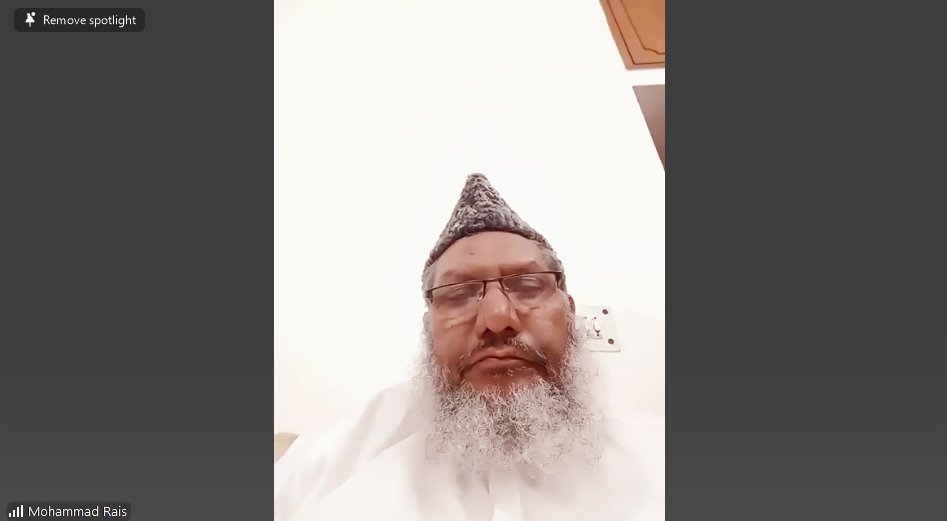
Another guest of honour, Maulana Asghar Ali Imam Mehdi Salfi, Ameer, Jamiat Ahle Hadith, said that the conference was being organised on a great personality like Maulana Abul Kalam Azad whose works and scholarly views still resonated in the minds of scholars. Such people were not always born. He noted that the times today were no different from the times in which he worked. His personality and work made him a great leader, nationalist, freedom fighter, scholar and an able administrator. He worked in almost every field with grit and exceptional adeptness. India was benefiting from the works he did in several fields. Whether it is the field of religious education, modern education or the high levels of ethics and character, the Maulana, was respected by the top personalities of the world. He was also a staunch supporter and champion of national integration and Hindu-Muslim unity. His views were very explicit from the stand point of the Qur’an and Sunnah. In this respect, his vision was broad as he was in favour of adopting good things of other religions. He described the Maulana as the Mujaddid of his times. He recited a few verses of Qur’an to explain different aspects of his life. His ideas were of high order. He was responsible for promoting modern education in India. Due to his endeavours, science and technology got boost in the country. The level of his scholarship could be gauged from fact that his writings were read out all over the world. His thoughts and utterances were of high standard. He worked for both the country and the Millat.
Maulana Asghar Imam held that India got recognition in the world of Islam in religious matters due to his scholarship and approach to religion. He called for giving a thought to the reason why the world was adrift despite scientific progress. His knowledge was based on the Qur’an and his actions corresponded to the teachings of Qur’an. He was born in Makkah in a family highly imbued with Islamic teachings. He was a king in the field of journalism. He suggested that his views on the country, Millat, Islamic values and communal harmony should be given a practical shape. He also emphasised that his ideas should be examined in the current perspective. His values for which he lived should be taken forward, he stressed.
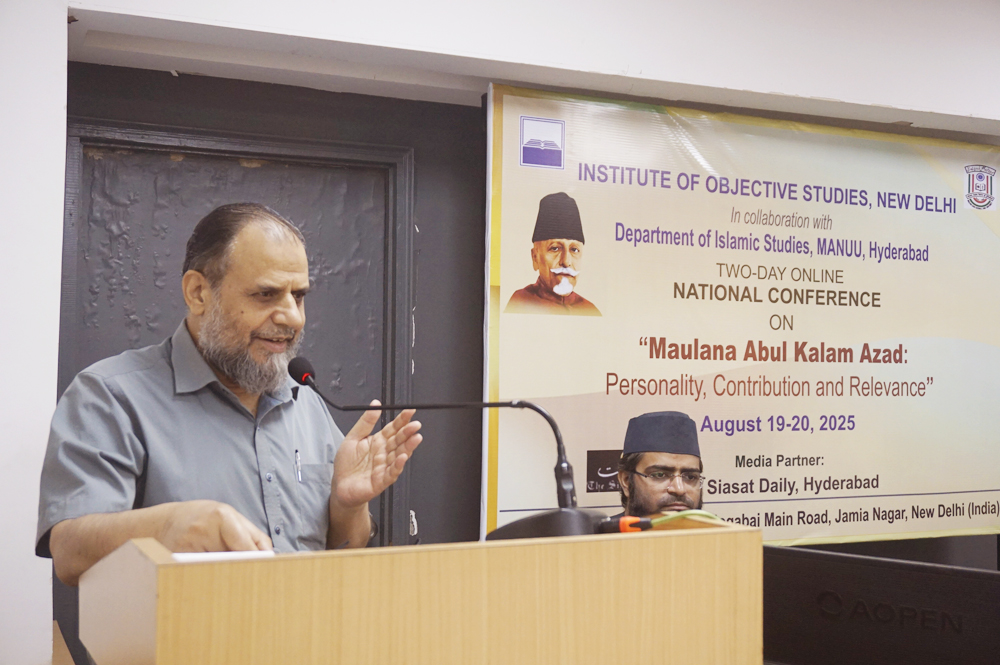
In his presidential remarks, the Chairman of the IOS, Prof. M. Afzal Wani, stressed the need for making an assessment of the role of Maulana Azad in giving the shape to the Indian Constitution. This needed to be explained. It was also important to know the role of the Maulana in developing the scientific temper among Indians. He said how today’s challenges could be made relevant to the contemporary world. He also said that the Maulana’s personality and his professional endeavours since 1958 be understood in a proper perspective. It should also be explored what were the ideals and values for which he stood and took them forward as a journalist. This should also be studied what impact his efforts made for the betterment of society. He also called for working on the Maulana’s endeavours for including fundamental rights and minority rights in the Constitution. Referring to Maulana’s biggest contribution, he said that he took Muslims to the right direction and led the community. What was also important for the scholars to present Maulana Azad and his work to the world. Today, Muslims needed a mentor who could guide them. He said that the status of a mentor was larger than a king. Thus, the Maulana was needed to be presented before the world as a mentor.
Prof. Wani held that the word ‘justice’ in globalisation, was today’s moot question. He said that ideals could not emerge if the diversity was reduced. He wanted to know if the ideals of Maulana Azad could play some role in that context. He regretted that journalists did not do any work on the multi-dimensional personality of Maulana Azad. English poets like Wordsworth and Charles Dickens were taught to children in school. Then why it was not possible to teach about the scholars and literary figures of our community in schools, he quipped. Maulana Azad could also be presented as a global mentor. He brought forth his thoughts but why his vision of India could not be taken forward. He suggested that the seminars and conferences like this should be held in future as well. He observed that Maulana Azad, along with Gandhiji and Jawaharlal Nehru, played a leading role in the drafting of the Preamble to the Constitution and the fundamental rights. It was the Maulana who advocated for the inclusion of the term ‘National Integration’ during the Constituent Assembly debates. He regretted that today the idea of justice was being rejected in the world. Calling for the cultural identity of every Indian, he said that the committee on culture had the Maulana as one of its members. This was the reflection of his rich cultural legacy. Defining scientific temperament, he noted that there should be honour for that. “We produced jurists and divided people into several schools of thought. Situation came to such a pass that every jurist made his own Firqa.” he said. The language the Maulana wrote, should be evaluated in proper perspective. Instead of sitting informally, scholars should sit together to discuss serious issues and arrive at a decision. He asked the university named after him to disseminate the Maulana’s ideals of the unity of India. The Maulana was the architect of modern India, he concluded.
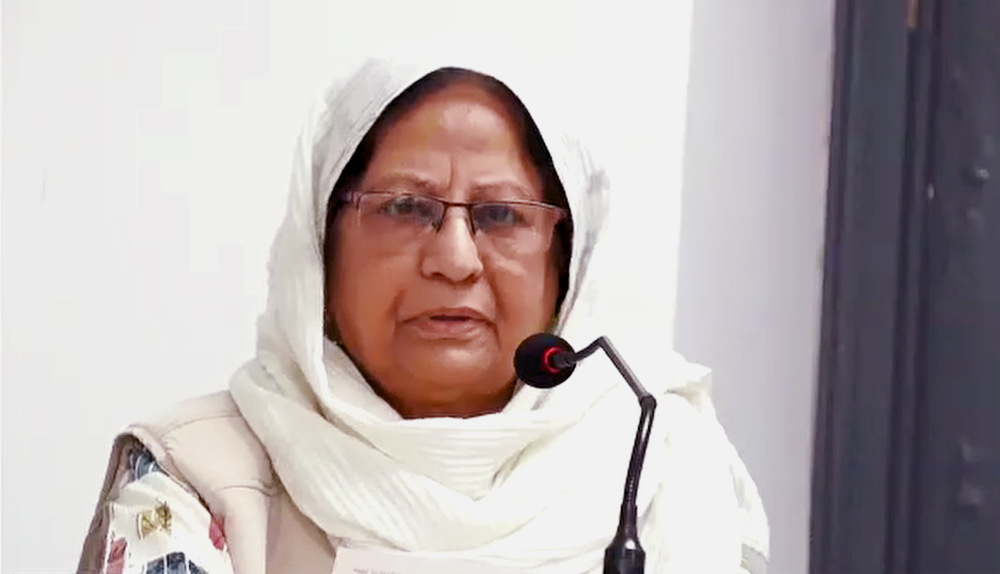
The inaugural session came to an end with the presentation of the vote of thanks by the Vice-Chairperson of the Institute, Prof. Haseena Hashia.
Technical Session-I
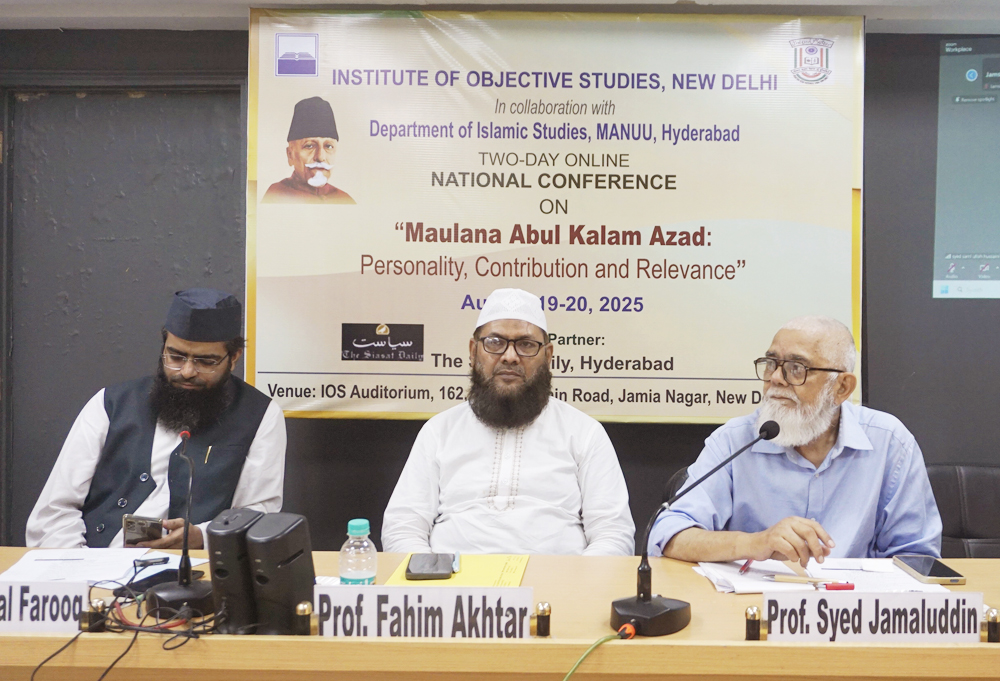
The first technical session was chaired by Prof. Syed Jamaluddin, Director, IOS Centre for Historical and Civilisational Studies, Aligarh. The theme of the session was focused on ‘Maulana Azad’s profile and his personality’. Dr. Md. Khalid Khan, Assistant Professor, Department of Islamic Studies, Jamia Millia Islamia, New Delhi was the first speaker of the session. He said that Maulana Azad was a journalist, analyst, scholar, writer and freedom fighter. His family’s connection is traced to Jalaluddin Dehlvi. He was self-effacing. He was born in Mecca in 1888, and his mother died in 1898. He studied Qur’an and Hadith, and was influenced from Sir Syed Ahmad Khan. He learnt English under his influence. He studied Al-Ghazali. He studied not only the Islamic philosophy, but also the philosophy of East and the West. Later on, he turned to Islam. He entered politics through journalism. His vision was very secular and focused on Hindu-Muslims unity. Dr. Shahid Husain Nadwi from the Department of Islamic Studies, MANUU, was the second paper presented who spoke on ‘Maulana Abul Kalam Azad: Profile and important imprints of his personality’. He said that the Maulana was a votary of Hindu-Muslim unity. After the attainment of freedom, he gave a message to the Millat that the reconstruction of the nation was the first priority. In order to give thrust to education, Education Commission and Secondary Commission were set up at his instance. He wrote a commentary on Qur’an which was known as ‘Tarjuman-ul-Qur’an’. He was so eloquent that he used to speak extempore whether it was literature or music. He was a nationalist to the core.
Assistant Professor of Theology, Aligarh Muslim University, Dr. Mohamamd Nasir was the third speaker who focused on ‘Maulana Azad and his writings in the modern context’. He wore several mantles at a time. He received early education from his father. He learnt the Qur’anic outlook of Islam and came to the conclusion that the Book is a guide to life. The Qur’an is meant for every sphere of life. He was a prolific writer, commentator of Qur’an and an expert of Qur’anic knowledge. The next speaker was research scholar, Islamic Studies, MANUU, Md. Salman Danish. He touched upon the topic ‘Maulana Azad’s intellectual journey on the canvas of Islamic Studies’. He said that the Maulana was an accomplished Urdu prose writer. Sometimes it was difficult to understand him. One had to have expertise in Islamiyat to understand his writings on Islamic knowledge. He had a religious proclivity. Syed Samiullah Husaini, research scholar in the same university, was the next speaker who spoke on ‘Maulana Abul Kalam Azad: An architect of modern Indian education’. He said that Pandit Nehru eyed on Azad while searching for an education minister. He was the initiator of modern education in India. He set up the UGC and established Akademis for the promotion of art and culture. He also underlined the importance of Hindi. He was the deputy leader of the Congress legislature party.
The sixth speaker was Mr. Basit Ahmad Sheikh, research scholar, Islamic University of Science and Technology, Kashmir. He dwelt on ‘The spiritual foundations of Maulana Azad’s thoughts: Tolerance and unity of religions.’ He observed that the Maulana was a freedom fighter, journalist and educationist. His intellectual foundations were Qur’an, Hadith and Fiqh (Islamic jurisprudence). He gave intellectual direction to India. He believed in the unity of religions. The next speaker was Ms. Hajirah Sultana, research scholar, Department of Education and Training, MANUU. She touched upon the topic ‘Critical reflections and higher order of thinking in the writings of Maulana Abul Kalam Azad’. She held that the Maulana’s personality was multi-faceted. Though there appeared to be a contraction between his intellectualism and social life. But, it was not so. He started his journalistic journey with Al-Hilal on July 13, 1912 in Calcutta. It was followed by ‘Al-Balagh’. This newspaper was devoted to the religious issues of Muslims. He dictated his biography ‘India Wins Freedom’ to Prof. Humayun Kabir. The last speaker was Dr. Jamshed Ahmad Nadwi, assistant professor of Arabic, Mumbai University, who focused on Maulana Azad’s Arabic writings. He said that the Maulana wrote a number of articles in Arabic. The number of such articles is said to be around 50. His political vision was very broad. So was his intellectual vision. He also did journalism in Arabic. Some of Maulana’s writings in Arabic were translated and published, he added.
Technical Session-II
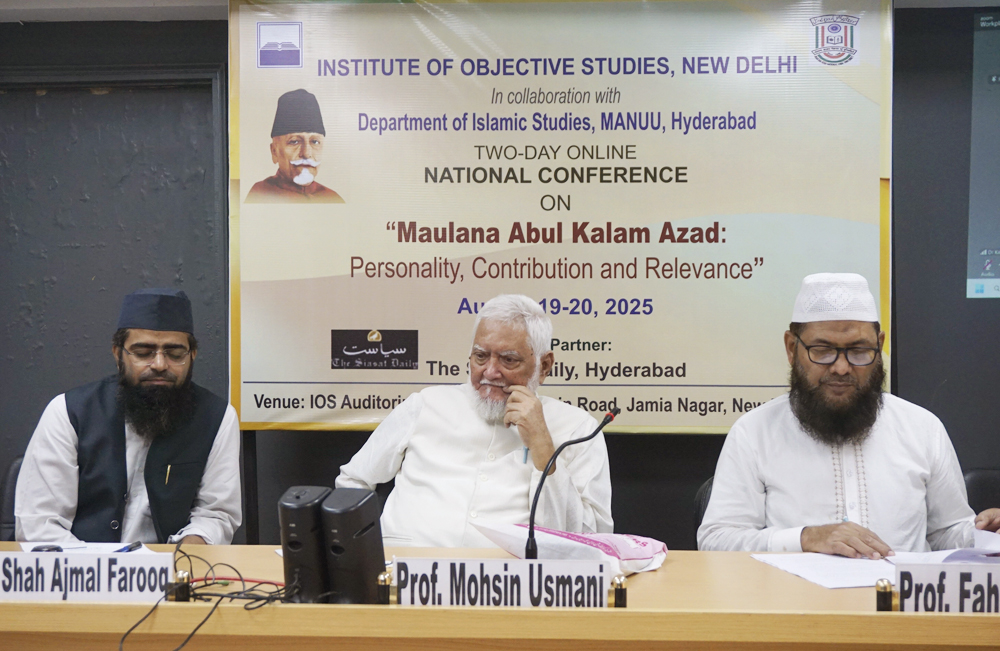
The second technical session was chaired by Prof. Mohsin Usmani Nadwi, ex-professor of Arabic, English and Foreign Languages University, Hyderabad and currently, editor of the quarterly ‘Muta’aliyat’ of the IOS. This session centered on ‘Maulana Abul Kalam Azad and Islamic Studies’. The first speaker of the session was Dr. Md. Kamal Ashraf, Assistant Professor, department of Religious Studies, Aliah University, Kolkata. His topic was, ‘Maulana Azad’s study of religions with special reference to “Tarjuman-ul-Qur’an”. He said that the Maulana wrote about several religions, including Judaism and Zoroastrianism in Iran. He also wrote about Christianity. He wrote about Buddhism and Hinduism and presented a detailed survey of them. He was of the opinion that the concept of God was also present in Hinduism. His existence was explained in Rigveda and other Vedas. All the prophets who were born in different countries had the same mission.
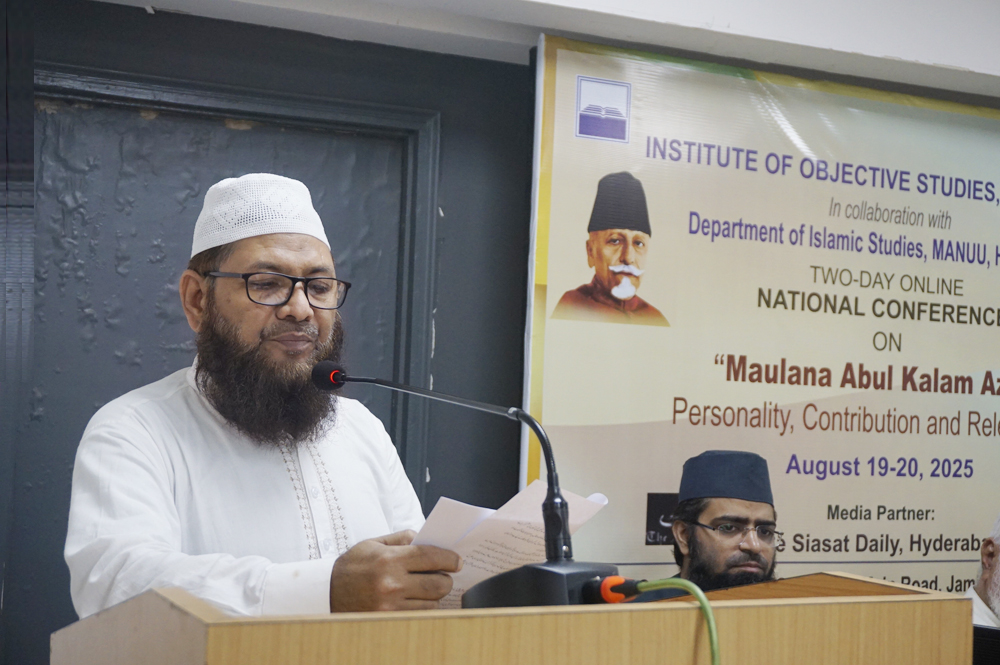
The second speaker was Prof. Md. Fahim Akhtar Nadwi, from the Department of Islamic Studies, MANUU. He spoke on ‘Maulana Azad’s research on Zulqar Nain and Yajooj-Majooj’. He observed that the Maulana presented a new theory on Zulqar Nain in Tarjuman-ul-Qur’an. In his theory, he claimed that either of the three figures might have been called Zulqar Nain. Zulqar Nain, an ardently believer of God, ruled over the world. According to his opinion Cyrus could be Zulqar Nain.
The third speaker was Dr. Bilal Ahmad Yatoo, guest faculty, Government Degree College, Jammu and Kashmir. He focused on ‘Maulana Azad’s profiling of Sirah: A philosophical and literary study’. He said that the Maulana’s name figured among those who rendered their services to the ‘Deen’. Besides, he worked on ‘Sirah’. He used to invite scholars to profile Sirah of the Prophet (PBUH). His love for the Prophet was very deep and he shed light on several aspects of Sirah.
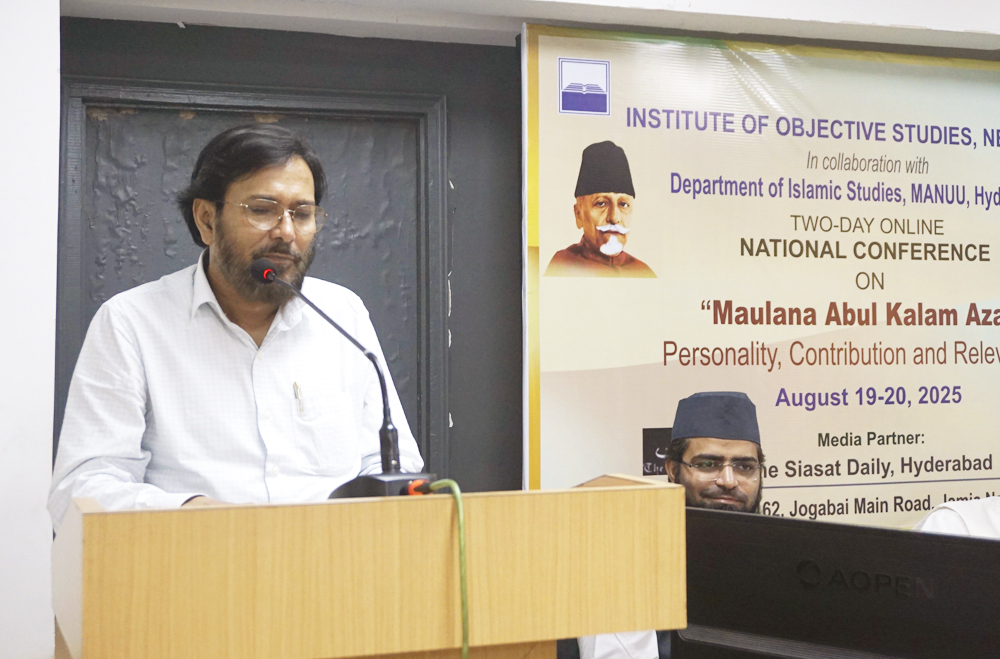
The fourth speaker was Mr. Ahmad Javed, senior Urdu journalist and writer, who spoke on ‘Maulana Azad’s view of education and the curriculum of madrasas.’ He said the standard of education in India needs much to be desired. Instead of sending their wards to madrasas, parents sent them to English medium schools. During the freedom movement, he had opposed the government run madrasas. He was made the chairman of the committee set up in 1931 to review Dini (Religious) education. He took keen interest in education and himself taught Dars-e-Nizami. He remained union education minister for 11-long years. He held a conference in Lucknow in 1948 in which the members of the management of madrasas participated. He said that the Uttar Pradesh government took no action on the recommendations of the Azad committee. The then chief minister of the State, Govind Ballabh Pant refused to implement recommendations saying that he would not allow the madrasas to become universities because they were entering by the backdoor. He believed that the contemporary system of education was influenced from colonialism and separatism. He also wanted the text books on science and social sciences should be written from the Islamic perspective.
The fifth speaker was Mr. Md. Saquib, research scholar, Islamic Studies, Jamia Millia Islamia, who said that Maulana Azad was not only an educationist, journalist, editor but also an Islamic scholar. He was of the firm opinion that the solution to the problems of the Muslims lay in the Qur’an. The Qur’an could be understood from the life of Sahabas. He presented a critical analysis of Christianity and Judaism. The sixth speaker was Mr. Md. Atif Ali, research scholar in Alia University, Kolkata. He focused on ‘Maulana Azad’s understanding of Qur’an and its significance in modern times.’ He said the Qur’an is not only the Book of spiritualism, but it is also a guide for leading a perfect life. He was followed by Ms. Naziya Begum from the sub-divisional centre, MANUU, Hyderabad. She centred her presentation on ‘Maulana Abul Kalam Azad and Islamic Studies.’ The next speaker was Mr. Md. Salahuddin, research scholar, Islamic Studies, MANUU. His topic was ‘Need for religion and the rejection of atheism: Maulana Azad’s viewpoint.’ The last speaker was Absar Alam, research scholar, Islamic Studies, MANUU. He touched on the topic, “Maulana Azad’s interpretation of Surah Fatiha and its analytical study.
Technical Session-III
The third technical session was chaired by Prof. Mohammad Habib. The session focused on ‘Journalistic magnificence of Maulana Abul Kalam Azad.’ The first speaker of the session was Dr. Md. Ajmal, assistant professor, Centre of Arabic and African Studies, JNU, Delhi. He spoke on ‘Maulana Azad’s journalistic manifestation for unity in diversity in India.’ He was followed by Dr. Arshi Shoeb, assistant professor, Islamic Studies, Women’s College, AMU. She devoted her paper to ‘Maulana Abul Kalam Azad’s journalistic response to British colonialism: A historical analysis.’
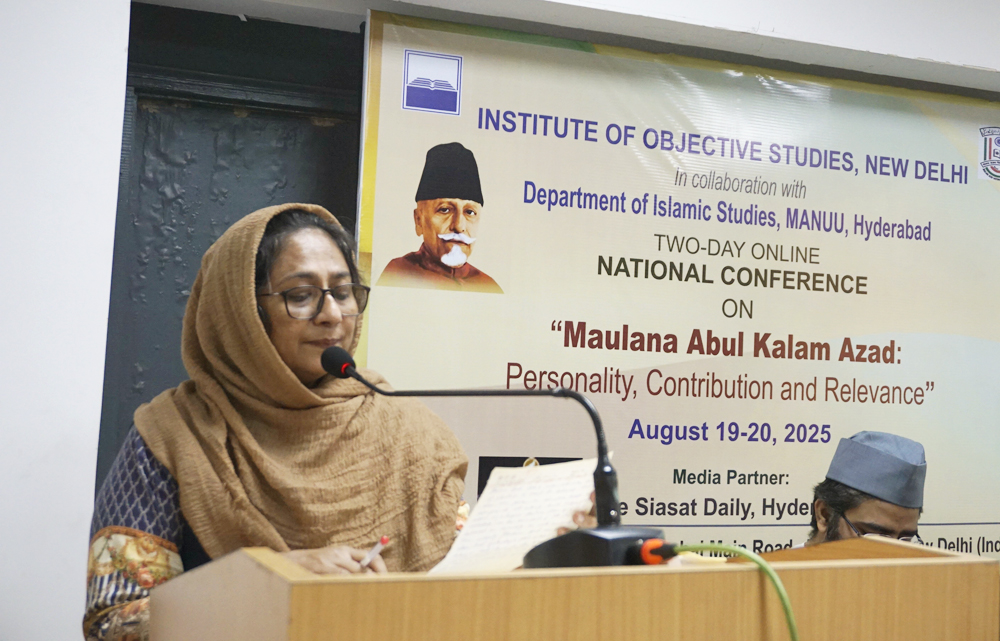
Ms. Fariyal, research scholar, Sunni Theology, AMU was the last speaker who touched upon ‘Maulana Azad’s journalistic vision.’ She said that Maulana issued the first newspaper at the age of 12 years. He wrote an article which enraged the Shias who threatened to sue and kill him. Both Al-Hilal and Al-Balagh were brought out with a purpose. Al-Hilal was issued in 1912 and ceased publication in 1914. Later on, he brought out Al-Balagh, but the British government went against it and ordered him to leave Bengal, she held.
Day-2
August 20, 2025
Technical Session-IV
Prof. Syed Jamaluddin chaired the fourth session. The session was devoted to ‘Maulana Abul Kalam Azad and Education: His vision and contribution.’
The first speaker of the session was Prof. Md. Mushahid, Department of Education, MANUU. He said that the Maulana had an independent opinion about women. He was very concerned about their education. He constantly made efforts for women’s education. He always pleaded for women’s rights and their independence. Ms. Naziya Begum, research scholar, Department of Education and Training, MANUU, was the second speaker who presented her paper on ‘Maulana Abul Kalam Azad and education: Vision and contribution.’ She was followed by Prof. Nasreen, Department of Education, AMU, who said that Maulana Azad had a versatile personality. He did his level best to restructure the colonial system of education. He was a man of planning which he introduced in the ministry of education. The fourth speaker was Mr. Md. Allam, research scholar, Department of Education, AMU. He spoke on ‘Analysis of Maulana Abul Kalam Azad’s educational vision of higher education in the context of the vision of National Education Policy (NEP) 2020.’ He was followed by Dr. Syed Hayat Basha, assistant professor, AMU, Mallapuram Centre, Kerala. He focused on ‘Maulana Azad’s educational philosophy: Islamic legacy and modern exigencies.’
The fifth speaker was Dr. Nihal Ahmad Ansari, assistant professor, MANUU College of Teacher Education, Asansol, West Bengal. He spoke on ‘The educational vision of Maulana Azad and his ideas, and the NEP-2020.’ The sixth speaker was Mr. Md. Anzar Alam, academic counsellor, Indira Gandhi National Open University, New Delhi. He centred his paper on ‘Educational leadership of Maulana Abul Kalam Azad.’ The seventh speaker was Mr. Mushfiquzzaman, research scholar, Department of Islamic Studies, Aliah University, Kolkata. He spoke on ‘Maulana Abul Kalam Azad’s Contribution to Madrasah Education.’ Ms. Fatima Zahra, research scholar, AMU, was the next speaker who expressed her views on ‘Maulana Azad and education: Perspectives and contribution.’ The ninth speaker was Dr. Shaikh Imran who held that the Maulana considered journalism as a religious duty. He also believed that journalism could prove to be an effective tool in revolution. The tenth speaker was Mr. Md. Nazim, research scholar, Department of Islamic Studies, MANUU, who focused on ‘Maulana Abul Kalam Azad and education: Perspective and contribution.’ He was followed by Mr. Md. Aamir, research scholar, Department of Arabic, AMU, who spoke on ‘Maulana Abul Kalam Azad: Educational philosophy and the shaping up of the new generation.’ The last speaker was Ms. Khursheed M.G. Makaani, research scholar, Islamic Studies, Jamia Millia Islamia. She based her presentation on Maulana Azad’s vision for modern education in India and the gap left within it that impede civic consciousness in Indians to date.
Technical Session-V
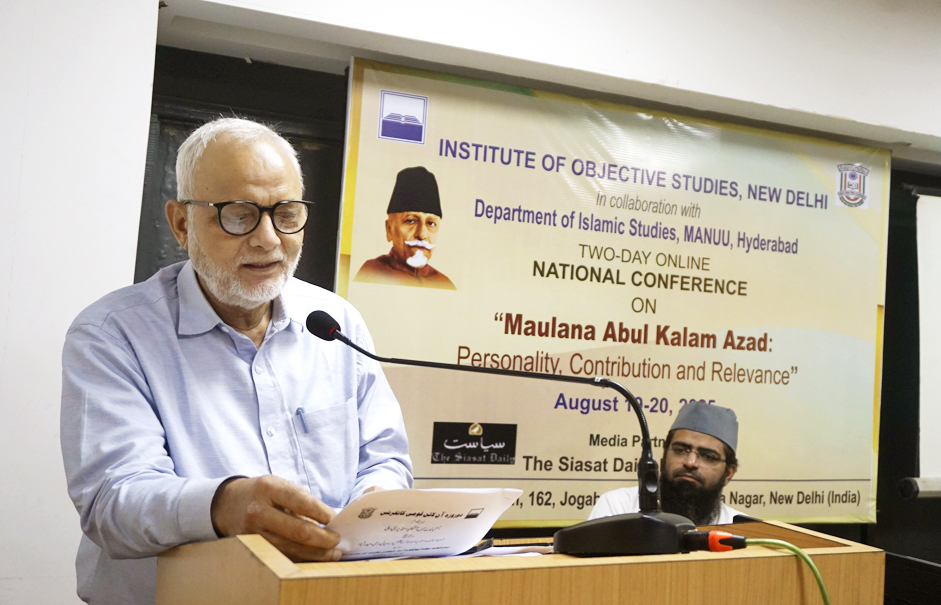
The fifth technical session was devoted to ‘Maulana Abul Kalam Azad’s place in the contemporary world.’ Former dean of social sciences and head of the department of Islamic Studies, Jamia Millia Islamia, Prof. Mohammad Ishaque chaired the session.
Assistant Professor of Islamic Studies, Aliah University, Dr. Md. Shamim Akhtar Qasmi was the first speaker, who presented his paper on ‘Women in the eyes of Maulana Abul Kalam Azad.’ He said that the Maulana confronted the English government. His concept of duties of men towards women was taken from the Qur’an. He was followed by Dr. Md. Shekaib Alam, assistant professor, Faculty of Shariah and Law, Villa College, Maldives. His topic was ‘Revisiting Maulana Abul Kalam Azad’s Vision for Hindu-Muslim unity in post-colonial India.’ The next speaker was Dr. Md. Ilham Sheikh, assistant professor, Islamic Studies, Kashmir University, Srinagar. He spoke on ‘Spiritual foundations of national unity from the teachings of Maulana Abul Kalam Azad.’ The fourth speaker was Dr. Shaista Parveen, associate professor, Department of Theology, AMU, who focused on ‘The status of women in the eyes of Maulana Abul Kalam Azad.’ The fifth speaker was Dr. Md. Akram, assistant professor, Department of Arabic, Delhi University. He presented his paper on ‘The art of Maulana Azad’s translation with special reference to Muslim Women’. He was followed by Dr. Ambreen, assistant professor, Department of Islamic Studies, AMU who spoke on ‘Abul Kalam Azad as a revivalist.’ She said that the Maulana wanted that education should be given to everyone without discrimination.
The seventh speaker was Dr. Rehan Akhtar Qasmi, assistant professor, Department of Theology, AMU, Aligarh. He spoke on ‘Maulana Abul Kalam Azad’s concept of national integration and its significance in India of today.’ The next speaker was Dr. Md. Tahseen Zaman, assistant professor, Department of Islamic Studies, Maulana Mazharul Haq Arabic & Persian University, Patna. He focused on ‘Maulana Azad’s concept of freedom in Islamic perspective.’ The ninth speaker was Dr. Md. Abrarul Haque, assistant professor, Department of Islamic Studies, Maulana Mazharul Haq Arabic & Persian University. He centered his presentation on ‘Maulana Azad’s concept of nationalism in the perspective of communal harmony.’ The tenth speaker was Dr. Md. Muslim, ex-Assistant Professor, AMU, who spoke on ‘Hindu-Muslim unity: A study of Maulana Abul Kalam Azad.’ Eleventh and the last speaker was Mr. Omair Azmi from IGNOU. He elaborated on the ‘Constituent Assembly and Maulana Azad.’
Technical Session-VI
Chaired by Prof. Md. Faheem Akhtar Nadwi, the session was devoted to the theme ‘The intellectualism of the ideas of Maulana Azad in modern times.’
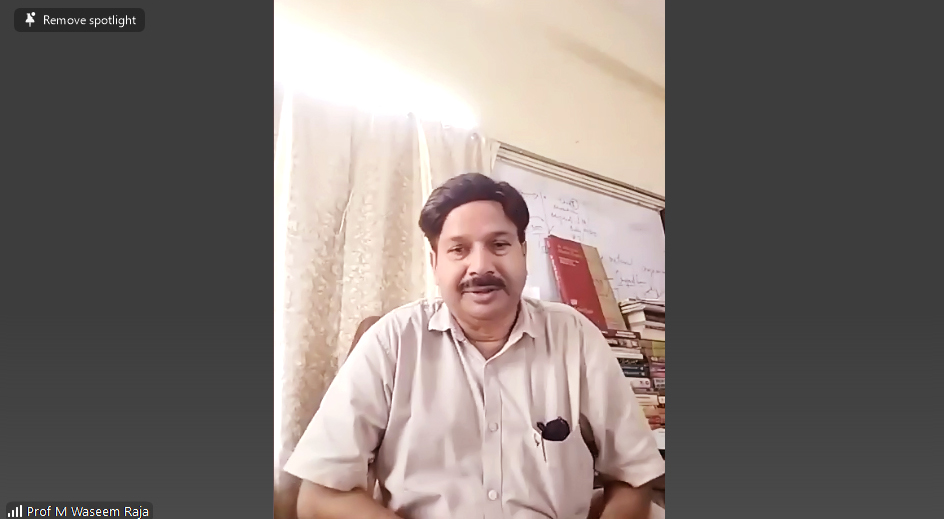
The first speaker of the session was Prof. Waseem Raja, professor, Department of History, AMU, Aligarh. He held that Maulana Azad was the last communicator of Qur’an who gave new perspective to the interpretations of the Qur’an. This also gave a new direction to religion. He said that Maulana Azad pleaded for a plural society. This is a vision which left much space for other religions. He was different from Mohammad Ali Jinnah in his thought. The Maulana said that he would not leave his country. He stayed in India after partition and served the country in top positions. He wrote more than 70 interpretations of the Qur’an. According to him Islam is a universal religion.
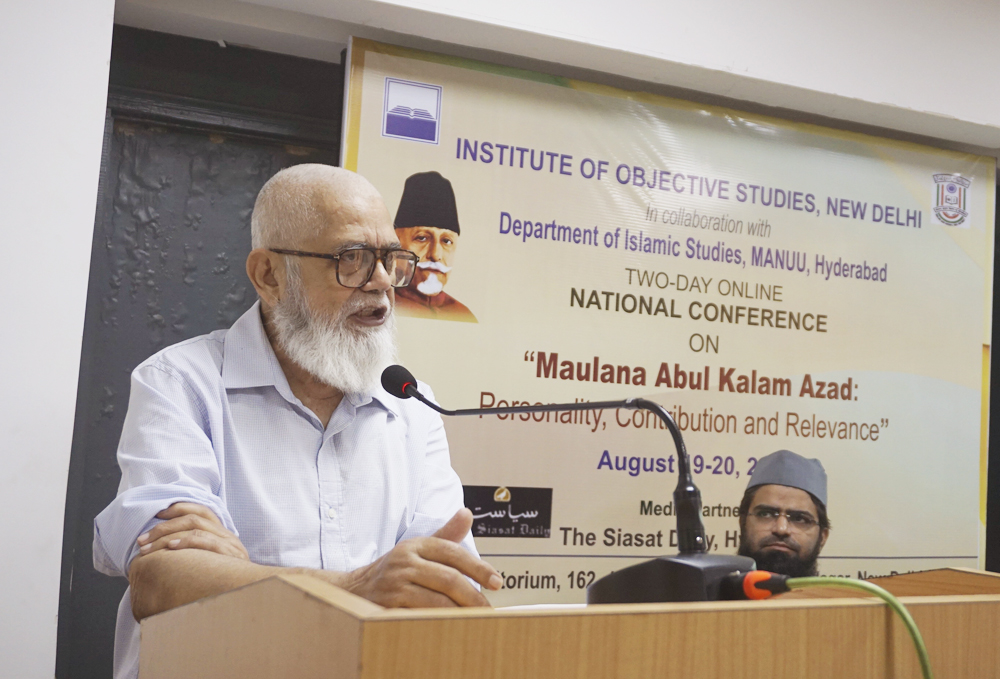
Prof. Syed Jamaluddin was the second speaker who remarked that he had been studying the Maulana for the last 31 years. He had close association with the revolutionaries of Bengal. The British government came out with the blue print of partition first time in 1905. It was Maulana Azad who opposed this. In 1940, his speech was read out at Ramgarh session of the Congress. He became Congress President first time in 1923. He said that he would not tolerate colonial subjugation.
The third speaker of the session was Dr. Md. Azam Qasmi, research scholar, Department of Theology, AMU, Aligarh, who centered on ‘The intellectualism of the ideas of Maulana in modern times.’ He was followed by Ms. Nilofar, research scholar, Department of Education, MANUU. She focused on the intellectualism of Maulana in modern India. Dr. Ahmad Abdul Haleem Khan, assistant professor, Department of Botany, Telangana University, Nizamabad. He dwelt on ‘Maulana Abul Kalam Azad – Contributions for education in science and technology.’
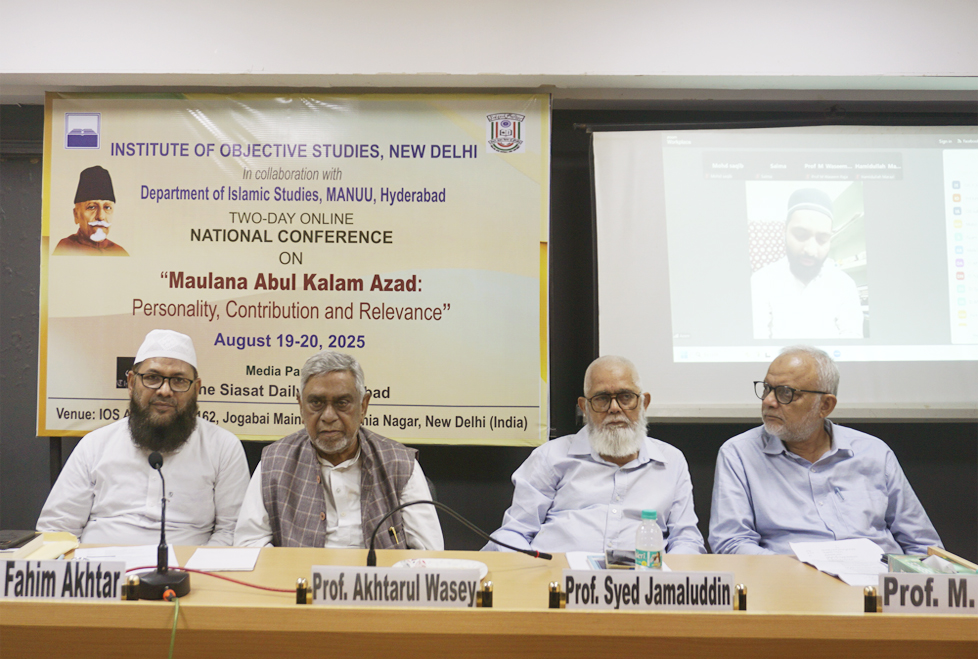
Valedictory Session
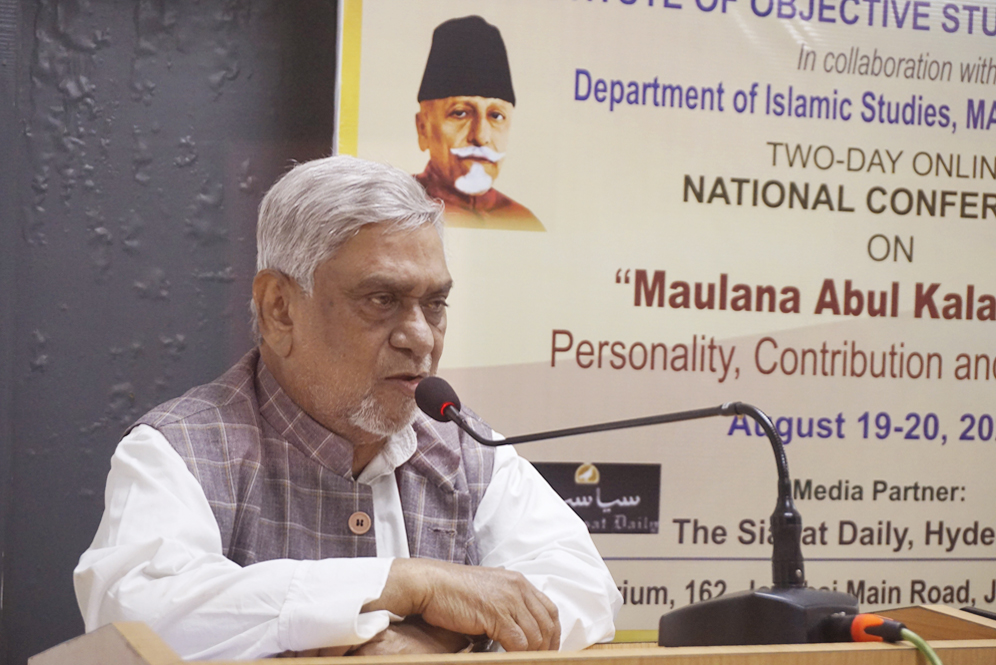
In his valedictory speech, Professor Emeritus, Department of Islamic Studies, JMI, Prof. Akhtarul Wasey, observed that for Indian Muslims, Maulana Azad was not only a leader, but also a planner. He was a planner who could pinpoint the area of the rainfall after sighting the direction of air. Whatever happened in the Sub-continent (India and Pakistan) in the last 57 years was predicted by him. He said that Allama Shibli Noumani recognised his capabilities much before and made him the editor of Al-Nadwa. He was not only the youngest president of the Congress party, but also the longest serving chief of the party. As a result of Muslim League leaders allegations against him with regard to the concept of oneness of God among other religions, he emphatically stated, like other Muslims that he believed in ‘Wahdat-e-Deen’ (Religion of one-ness of God). He said that the Maulana played a crucial role in the reconstruction of India. He quoted Mahmud Al Hasan as saying that Maulana Azad wakened the sleeping community through Al-Hilal. In his ‘Ghubar-e-Khatir’, he had a different style in every letter. He appears to be in new form in journalism from Al-Nadwa to Al-Hilal. He observed that Jesus Christ had 12 companions, but one of them disappeared. Thus Maulana Azad’s importance did not diminish even after the formation of Pakistan. The initiatives he took in the departments he looked after could not be lost sight of. IIT Kharagpur, Sahitya Akademi, Sangeet Natak Akademi and other leading institutions are testimony to his importance in nation-building. Once he said, ‘If an Angel climbs the top of Qutub Minar and declares, I will give you Swaraj without Hindu-Muslim unity, I will outright reject it’. His language was not only Arabic and Persian, but also Urdu. He was bitterly against partition of the country. He restructured the education system. His personality was as great as that of Gandhiji and Nehru, he concluded.
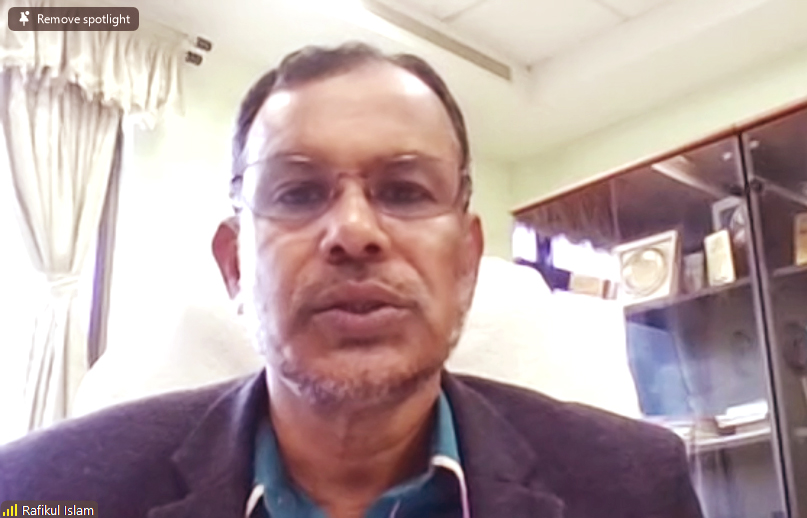
Speaking as a guest of honour, Vice-Chancellor of the Aliah University, Prof. Rafiqul Islam, said that Maulana Azad was one of the tallest figures of India. He was not only a political leader, but also an astute journalist, editor and poet. He united people across religious spectrum. He went to jail several times for freedom. His contribution in several fields was foremost. He laid foundation for several institutions of fame, like, UGC, IISc, School of Planning and Architecture and Akademis. He promoted both culture and languages. He did a lot for Urdu and Hindi. He said that he would refuse Heaven at the cost of Hindu-Muslim unity. His message of cultural unity was a priceless gift to India. He tried to combine East and West. He was for a harmonious India.
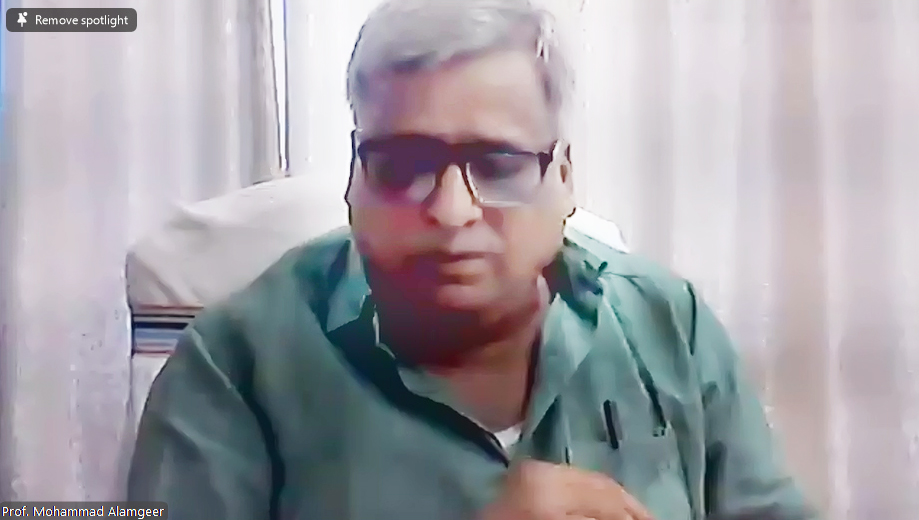
In his speech, another guest of honour, Vice-Chancellor of Maulana Mazharul Haq Arabic & Persian University, Patna, Dr. Md. Alamgir, held that the Maulana accepted the partition of India as a last resort. According to Azad, education should conform to the times. He strengthened IITs, Jamia Millia Islamia and Aligarh Muslim University. He was of the opinion that education should be for all. It should not be confined to a particular class because it was not the prerogative of any particular family. He stressed the need for giving practical shape to the vision of Maulana Azad. He disengaged Muslims from communal mindset and brought them into the national mainstream. He set the madrasa curriculum not only in Ranchi and Patna, but also in the entire country. He laid stress on women’s education. His vision was reflective of the teaching of Qur’an and Hadith.
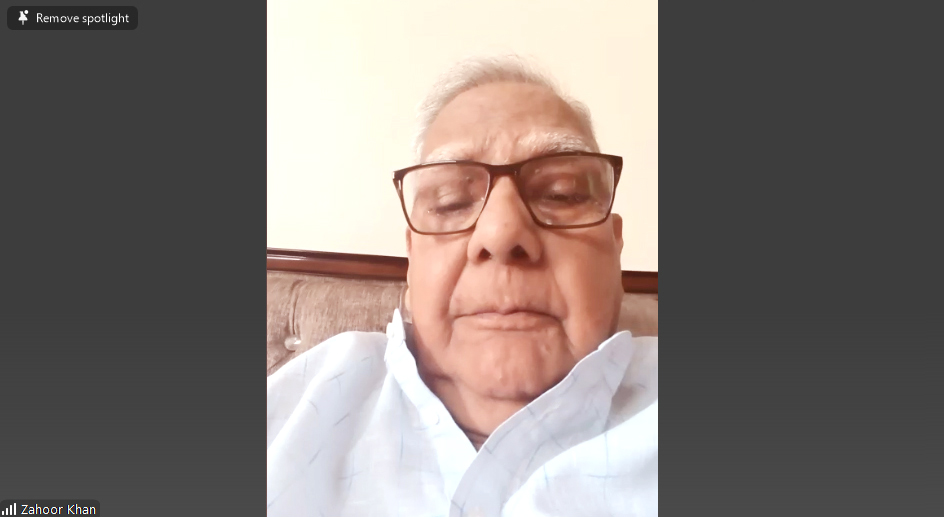
In his presidential remarks, the patron of the IOS, Prof. Z.M. Khan said that Maulana Azad was a multi-faceted personality. In whatever field he entered, he executed it in a passion that was near to perfection. He entered the Congress party where he commanded much respect. His advocacy covered all aspects of his thoughts. He recalled that he once visited Maulana Azad’s residence where he saw Pandit Jawaharlal Nehru himself controlling the crowd which had assembled around his residence. ‘Tarjuman-ul-Qur’an was his most important book. He held that he was very much impressed with the Maulana and his personality. He possessed both Imaan-e-Mufassil (Good and pious deeds) and Iman-e-Mujmal (Propagation of truth). Maulana Azad’s ceaseless efforts did bear fruits, he added.
At the end of the valedictory session, a six-point resolution was unanimously adopted by the participants. The resolution read out by Maulana Shah Ajmal Farooq Nadwi, is as follows: -
- It is a happy augury that the attraction of the personality and the services of Maulana Abul Kalam has not diminished even today. Despite the presence of a plethora of intellectual work, Maulana Azad continues to be a loved figure of the intellectual world till date. Thus, it is strongly felt that his personality should be subjected to intellectual pursuits.
- This conference feels that Maulana Azad’s modern propositions should be made topics of meaningful discussion and research, especially in India.
- During the conference, it was felt that several aspects of Maulana Abul Kalam Azad’s personality still remain untouched. There is thus a need to work on these topics. These include the comparative study of Tarjuman Al-Qur’an and other Urdu interpretations of the Qur’an. They also include the comparative study of Maulana Azad and spiritualism, Maulana Azad and his contemporary ulema and intellectuals; fundamental elements of Maulana Azad’s political and social thoughts; research on the critics of Maulana Azad; association of Maulana Azad with the revolutionaries of Bengal; and the Lingua Franca and Maulana Azad.
- The idea also emerged in the conference that a comprehensive history of India, independent of the view-point of non-Indian (Western) historians, be re-written and compiled. This was the dream of Maulana Azad. The need for realizing this dream is felt today more than ever before. Academic institutions, particularly those named after Maulana Azad, should pay attention to this.
- It was strongly felt in the conference that efforts should be made to understand and adopt the message of Maulana Abul Kalam Azad from different standpoints. This can be done by organizing conferences, seminars and lectures. Institute of Objective Studies has started this intellectual initiative by way of organizing this conference. It is the duty of academic and research institutions to take this message forward. IOS can coordinate with other institutions in such intellectual programmes.
- This conference deems it necessary to thank all the stakeholders who extended their cooperation and support in making this conference a success.
The Vice-Chairperson of the IOS, Prof. Haseena Hashia, extended a vote of thanks to all the participants at the conclusion of the conference.
Go Back